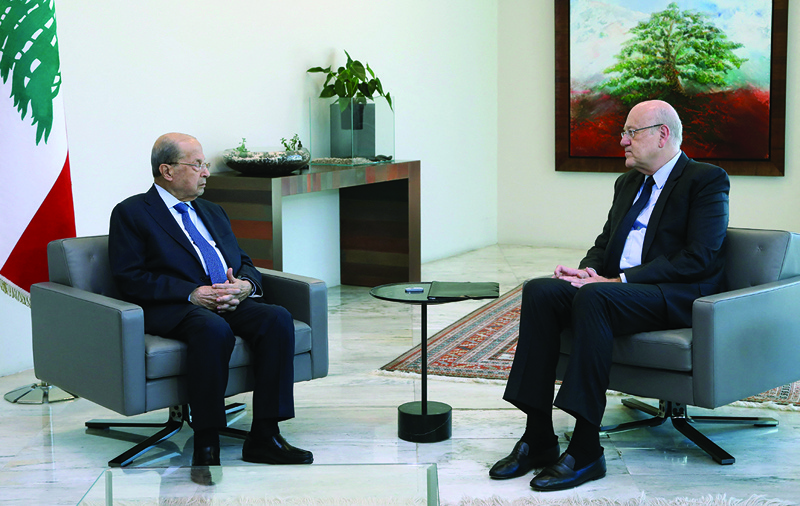 BAABDA, Lebanon: A handout picture provided by the Lebanese photo agency Dalati and Nohra shows Lebanon's President Michel Aoun meeting with premier-designate Najib Mikati at the presidential palace in Baabda, east of the capital Beirut, yesterday. - AFP
BAABDA, Lebanon: A handout picture provided by the Lebanese photo agency Dalati and Nohra shows Lebanon's President Michel Aoun meeting with premier-designate Najib Mikati at the presidential palace in Baabda, east of the capital Beirut, yesterday. - AFPBEIRUT: Lebanon reeled yesterday from a deadly explosion that burned alive people desperate to fill plastic containers with fuel in a country sinking ever deeper into darkness and chaos. At least 28 people were killed when the fuel tank, which was swarmed by residents clamouring to fill their vehicles amid crippling shortages, blew up early on Sunday in the northern region of Akkar.
The latest deadly disaster comes as Lebanon grapples with an economic crisis described by the World Bank as one of the world's worst since the 1850s. Nearly 80 people were also injured in the blast, many of them with burns that further overwhelmed hospitals struggling to function without electricity, medics said. Yesterday, foreign countries and UN agencies were scrambling emergency aid to help exhausted health workers cope with the new influx of serious injuries and run DNA tests on the charred remains of the dead.
Shortages of key commodities have accelerated and compounded one another in recent days, leaving much of Lebanon struggling to source fuel, gas and even bread, with buying power pummelled by the currency losing more than 90 percent of its value on the black market. The country's six million inhabitants now fear the internet and drinking water will be next to disappear. The blast in Akkar, one of the most impoverished parts of the country, was a deadly direct consequence of a vicious cycle fast turning the region's erstwhile beacon of modernity into a failed state.
The scenes of horror piled trauma on a country still coming to terms with last year's cataclysmic Beirut port explosion that killed more than 200 people and disfigured the city. Nobody has been held to account for the port blast, caused by the poor storage of enormous quantities of ammonium nitrate that had languished there for years.
'Need to leave'
Across the country, with no more than two hours a day of mains electricity supply, many shops and restaurants remain closed, unable to source fuel for their generators. Many private and public sector employees have been told to stay home and most of the rest have often ended up doing the same for lack of transport options.
Stuck in an endless queue of cars at a Beirut petrol station, Mohammed, who did not want to give his full name, said he could see no light at the end of the tunnel. "We need to leave Lebanon. We all need to get out," said the 30-year-old engineer. "I've started working on it, and God help those who stay."
His six-month-old baby had cried through the sweltering night, and his family was being forced to spend hard-earned savings on operating a private generator to keep his grandmother's oxygen concentrator running. "There's no more hope," he said. The state has declared a national day of mourning over the Akkar blast, a move unlikely to offer much solace to a population that blamed those very authorities for the tragedy.
Angry protesters on Sunday torched the home of the landowner on whose plot the tragedy unfolded, accusing him of involvement in a hoarding and smuggling scheme allegedly covered up by top officials. The exact circumstances of the explosion, which happened at night and as a huge crowd of people swarmed the tank, have yet to be fully established.
'Massacre'
Gas station owners have been accused of hoarding fuel ahead of an expected price hike, causing crippling shortages and spawning a ruthless black market that is enriching a small cartel and choking the rest of the country. The central bank last week warned it could no longer afford to subsidise fuel imports. A few dozen people protested on Sunday in front of the Beirut home of Najib Mikati, who was recently appointed prime minister-designate.
The country's richest man is the third person to attempt to form a government since the last one resigned in the aftermath of the Beirut port blast last August. Sahar Mandour of Amnesty International called the Akkar blast "a massacre resulting from an economic crisis caused by massive corruption that has been going on for years." "The latest economic crisis didn't close the door to corruption... it aggravated it to an extent that it is now deadly," she told AFP yesterday. The lack of a government is freezing international assistance that could help dig Lebanon out of the abyss.
As every aspect of daily life unravels, sometimes deadly scuffles have broken out at petrol stations and residents across the country fear for their safety. "I feel like crying about everything," said Farah, a 21-year living in the mountainous Chouf region. "I'm scared we'll get to the point where we can't leave this country, even from the airport... We only have the sea left. I feel we'll drown trying to get out," she said. - AFP










